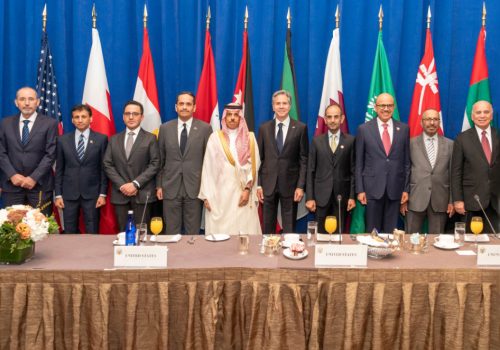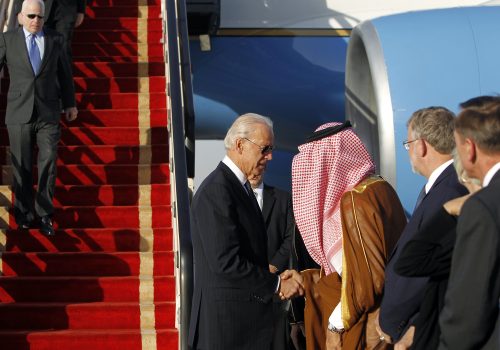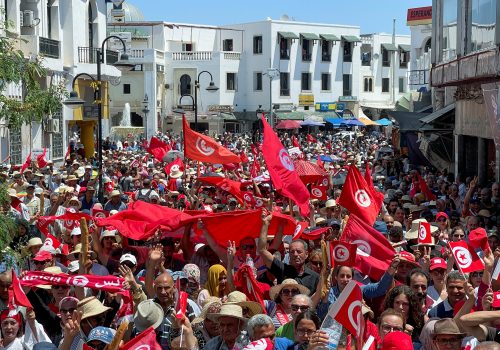The current Libyan situation is undoubtedly the product of many factors that would be too long to list and discuss in this paper. Nevertheless, there is no doubt that the conditions in which the 2011 Libyan revolution occurred are among the main causal determinants. That the revolt was considered a revolution of a whole people against a dictator and a few mercenaries was utterly wrong. It is clear now that the Muammar Gaddafi regime still had a meaningful consensus. Therefore, the revolt could be considered more of a civil war rather than a revolution. This misunderstanding caused the international community and the new Libyan elite to focus on elections instead of beginning a national reconciliation effort to rebuild consensus among the population and write a new social contract.
The focus on elections did not bring the establishment of a new political regime but, by crystalizing differences among the forces on the ground, caused the perpetuation of the same civil war, which is still ongoing today, albeit in a different form.
The other big mistake was the enactment, on April 11, 2013, of the General National Congress’s Political Isolation Law “with the aim of removing former [Gaddafi] personnel from the country’s political, economic, educational, and security institutions. This law represented a purely punitive instrument, without any of the conciliatory measures that have proved instrumental” The enactment of this law—barring individuals from holding government positions or participating in Libya’s political life if they had supported or been involved to any extent with the previous regime—caused the definitive break between old and new elites and the system’s polarization.
The rest of Libya’s more recent history is the continuance of this dynamic with relative differences among actors and players. The fragmentation of the country in various diverse and antagonistic poles occurred in all the milestones of today’s Libya’s history, such as the clashes in 2014 between General Khalifa Haftar’s militias in the Eastern part of Libya (what is historically known as Cirenaica) and a set of mostly Islamist militias dominant in the western part operating under the name of Libya Dawn. It became clear that the political fragmentation that caused the proliferation of militias and warlords and determined the paralysis of the Libyan system was the inevitable outcome of the previous structural socio-political conditions described above.
The intervention of external actors, in particular those regional and international powers that have projected their national interests onto the country, should be added to the conditions that led to this internal situation . A geopolitical confrontation soon turned into full support for rival Libyan local political factions and/or armed militias, heightening internal fragmentation. For example, the maintenance of a division between an eastern region dominated by General Haftar and his militias and another area in the west under the United Nations–recognized government of Fayez Serraj is the result of strongly Egyptian and Emirati support for Haftar versus Italian, Turkish, and Qatari support for Tripoli.
For a long period, the situation in Libya was considered a de facto proxy war. Deeper studies showed this was only partially the case; it was evident that the domestic actors were not simply proxies but maintained a relative degree of independence and the capacity to manipulate the foreign backers according to their interests.
With the passing of time and the lack of oversight and control from a central government, the various militias turned into gangs while the international community stood idly by and discussed phantasmal disarmament, demobilization, and reintegration and army training programs. Little by little, the gangs entrenched themselves in diverse territories, primarily through illegal means such as extortion and racketeering, beyond their increasing involvement in the various smuggling trades.
After the failure of the attack by General Haftar’s forces against the city of Tripoli in 2019, the international community, led by Special Adviser to the Secretary-General on Libya Stephanie Williams, devised and planned for the election of a government of national unity (GNU) to be elected by an assembly of Libyan representatives selected by the United Nations, the Libyan Political Dialogue Forum (LPDF). This assembly, formed by seventy-five members representing multiple constituencies, elected a three-person Presidential Council headed by President of the Presidential Council Mohamed Mnefi and Prime Minister Abdulhamid Dbeibah.
The government’s task was mainly to prepare the country for a round of presidential and parliamentary elections. For multiple reasons, the GNU failed in doing so. The parliament in Tobruk, the House of Representatives, demanded the resignation of Dbeibah. At his refusal, they proceeded to appoint Fathi Bashaga as the new prime minister. However, Bashaga never succeeded in entering Tripoli and assuming the role of prime minister. Dbeibah was elected by bribing some of the voters in the LPDF and continued to govern the country through a vast system of corruption and cooptation.
This allowed the various gang-like militias to entrench their positions further and strengthen their grip on the local territories. While Libya remained formally divided, very recently, behind-the-curtain deals among Haftar’s sons and relatives of Dbeibah seem to lead to an agreement to form a new Dbeibah-led reshuffled government. The main purpose of this new government would be to lead the country to elections. However, according to most, it will only be a continuation of the previous one—which means a continuation of corruption and pillage of the country’s resources by these ruling groups.
This most probable outcome of the Libyan process—the progressive creation of a mafia-like state in the middle of North Africa—seems to be the most certain outcome. Such an end could hypothetically be avoided by a military intervention by a more substantial power, such as Turkey or Egypt, that conquers the country and exercises overwhelming power to establish the rule of law. It is a possibility but not highly probable. The alternative, constituted by the potential agreement among healthy Libyan elites, is also improbable as there is no sign of these elites. Another possible scenario could be a conscious decision by a Western country to exercise pressure and other means to force Libyan elites to follow a direct path to election, creating a shared government of national unity and the slow progressive establishment of a pluralistic modern system.
However, almost none of these scenarios will likely bring a positive outcome. All the pain and suffering that the Libyan population has been enduring since 2011 could have been avoided had the international community and the new Libyan elite paid more attention to the reconstruction and rebuilding of the state rather than the conquest and appropriation of power.
Karim Mezran is director of the North Africa Initiative and resident senior fellow with the Rafik Hariri Center and Middle East Programs at the Atlantic Council
Alessia Melcangi is a nonresident senior fellow at the Atlantic Council’s Rafik Hariri Center and Middle East Programs, associate professor of contemporary history of North Africa and the Middle East at the Department of Social Sciences and Economics at the Sapienza University of Rome.
In partnership with

Related content
Image: Libyan Prime Minister Abdel Hamid al-Dabaiba seen during the sixth anniversary of the elimination of the "Islamic State" in Sirte. | Alatrash / SOPA Images/Sipa USA



